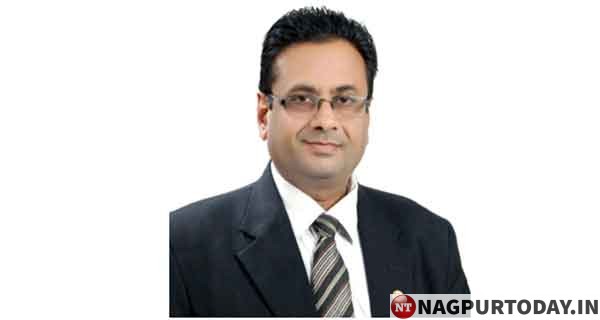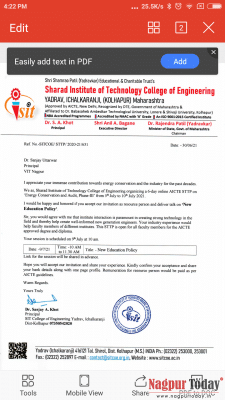Sharad Institute of Technology College of Engineering , Yadrav Ichalkaranji, has arranged webinar of Dr. Sanjay S Uttarwar a Renowned Motivational Speaker and Academician from Nagpur on topic “ National Education Policy 2020 “Live on go to meeting platform. Dr. Sanjay Uttarwar Nationally renowned orator and Principal of VIT Engineering College from Nagpur was speaker for webinar. Majority of viewers around the globe was on line for the webinar. Dr S A Khot Convenor for STTP and Principal of College, welcome all the participants and resource person in his address. Other prominent person Shri Anil Bagne Executive Director of sanstha was present for program. Webinar starts with the present condition of Academic scenario and picture expected in NEP 2020.
Speaker share present status of academics with gathering. He gave brief idea about societies and Govts expectations from teacher as a whole. Dr. P M Bhagwat, Dr K Husain Coordinators of STTP and Prof. M M Khade, Prof. Asif Jamadar, Prof Chetan Patil Co Cordinators was present and has played active role for success of STTP. Staff SITCOE was online for webinar. Comparer give brief introduction about Speaker, Welcome all dignitaries on line for webinar. Dr Uttarwar explained Aim, Principles , Structure of NEP to the online participants of webinar. He is a renowned Academician of central India and in this field since last thirty two years.
He has proved his expertise by serving renowned educational groups of Maharashtra and MP. He does graduation from Amravati University and Post graduation and PhD from Visvesvaraya National Institute of Technology Nagpur in Mechanical Engineering. He has done MBA in HR and MKTNG from RTMNU Nagpur. He has served renowned educational groups from Maharashtra and MP in various Capacities. From Last eight years he is working as Principal of Engineering College. He is recipient of seven National and International Level Awards for his outstanding contribution to the field of academics and research.
He has visited UK, Singapore, China to present research papers in International Conferences. He is having sixty three research papers to his credit which are published in International Journals and Conferences. He is a renowned Motivational Speaker from region and is frequently invited by TV Channels, Radio and Educational Institutes for delivering lectures on various motivational topics. In addition to it he is a popular singer from Nagpur and has performed at various musical concerts which took place at auditoriums of Nagpur.
In his delivery Dr. Uttarwar elaborate the importance of Implementation of NEP for better future of India. He says that teacher has to play key role in Nation Building, in NEP2020. Teachers should work to improve logical thinking ability of child in his early age of three to six years which is a crucial phase. Dr. Uttarwar further says that, 85 % of child’s brain develops in this age group, which should be framed cautiously.
That’s why he says that role of Primary and secondary teacher is of utmost importance. The world is undergoing rapid changes in the knowledge landscape. With various dramatic scientific and technological advances, such as the rise of big data, machine learning, and artificial intelligence, many unskilled jobs worldwide may be taken over by machines, while the need for a skilled workforce, particularly involving mathematics, computer science, and data science, in conjunction with multidisciplinary abilities across the sciences, social sciences, and humanities, will be increasingly in greater demand. . There will be a growing demand for humanities and art, as India moves towards becoming a developed country as well as among the three largest economies in the world .
The gap between the current state of learning outcomes and what is required must be bridged through undertaking major reforms that bring the highest quality, equity, and integrity into the system, from early childhood care and education through higher education While explaining the Role, Responsibilities and Opportunities for teacher , he says that National Education Policy 2020 , has totally changed the role of teacher. Teacher should not confine him to his field only. He should possesses the all round knowledge to fulfill demand of hour. So the role of teacher in coming days is very crucial to frame the future of India. He further elaborate about ancient education system of our country. The rich heritage of ancient and eternal Indian knowledge and thought has been a guiding light for this Policy. The pursuit of knowledge (Jnan), wisdom (Pragyaa), and truth (Satya) was always considered in Indian thought and philosophy as the highest human goal. The aim of education in ancient India was not just the acquisition of knowledge as preparation for life in this world, or life beyond schooling, but for the complete realization and liberation of the self. World-class institutions of ancient India such as Takshashila, Nalanda,Vikramshila, Vallabhi, set the highest standards of multidisciplinary teaching and research and hosted scholars and students from across backgrounds and countries. The Indian education system produced great scholars such as Charaka, Susruta, Aryabhata, Varahamihira, Bhaskaracharya, Brahmagupta, Chanakya, Chakrapani Datta, Madhava, Panini, Patanjali, Nagarjuna, Gautama, Pingala, Sankardev, Maitreyi, Gargi and Thiruvalluvar, among numerous others, who made seminal contributions to world knowledge in diverse fields such as mathematics, astronomy, metallurgy, medical science and surgery, civil engineering, architecture, shipbuilding and navigation, yoga, fine arts, chess, and more. Indian culture and philosophy have had a strong influence on the world. These rich legacies to world heritage must not only be nurtured and preserved for posterity but also researched, enhanced, and put to new uses through our education system. The new education policy must provide to all students, irrespective of their place of residence, a quality education system, with particular focus on historically marginalized, disadvantaged, and underrepresented groups.
Education is a great leveler and is the best tool for achieving economic and social mobility, inclusion, and equality. Initiatives must be in place to ensure that all students from such groups, despite inherent obstacles, are provided various targeted opportunities to enter and excel in the educational system. Govt is also planning to give all sort of training to teachers. Further Dr. S S Uttarwar explain structure of NEP and the role of NEP for better future of India. He says that In NEP 2020, school education structure is modified with Pedogogical and Curricular restructuring of 5+3+3+4 covering the ages 3-18 years. There are four stages . first is foundational stage which is from age 3 to 6 for anganwadi or pre school. Age 6-8 , two years is for class 1 and 2.
Second stage is preparatory stage in the age 8-11 ie three years for class 3 to 5. Third stage is middls stage at age 11 to 14, ie 3 years for class 6 to 8. And forth stage is secondary at the age 14-18 ie four years for class 9 to 12. In current system age group 3 to 6 is not covered in 10+2 structure.as class 1 begins at age 6. In 5+3+3+4 structure a strong base of early chieldhood care and education from age 3 is included which will promote better learning’s. Dr. Uttarwar further says that, 85 % of child’s brain develops in this age group, which should be framed cautiously. Anchor has nicely navigate the show and express views effectively during webinar and has also given heed to various points of NEP . Host gives concluding remarks Speaker extend his thanks to organizers for excellent and smart work of live broadcasting of webinar on go to meeting platform and thanked Organizing team for inviting him for the webinar. Dr S A Khot, delivers summed up address . Prof. M M Khade propose vote of thanks.





















